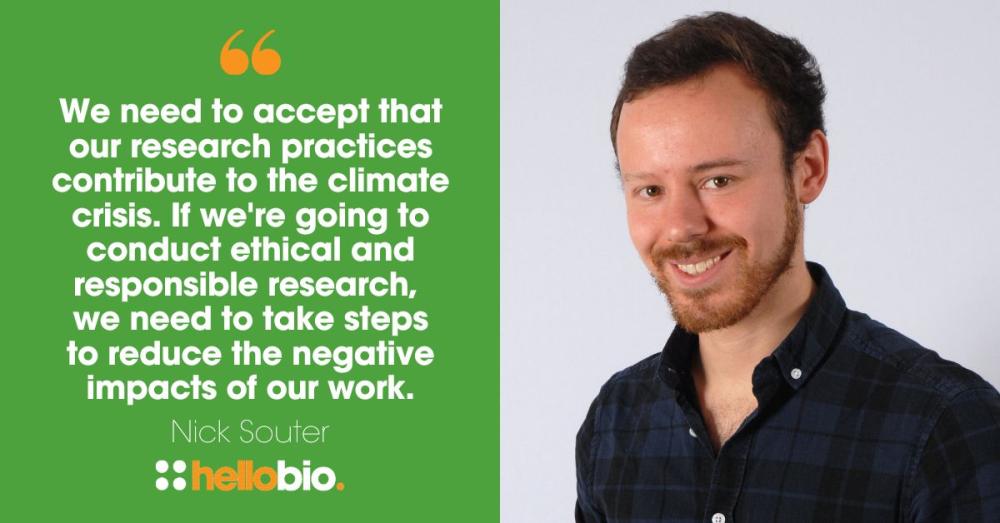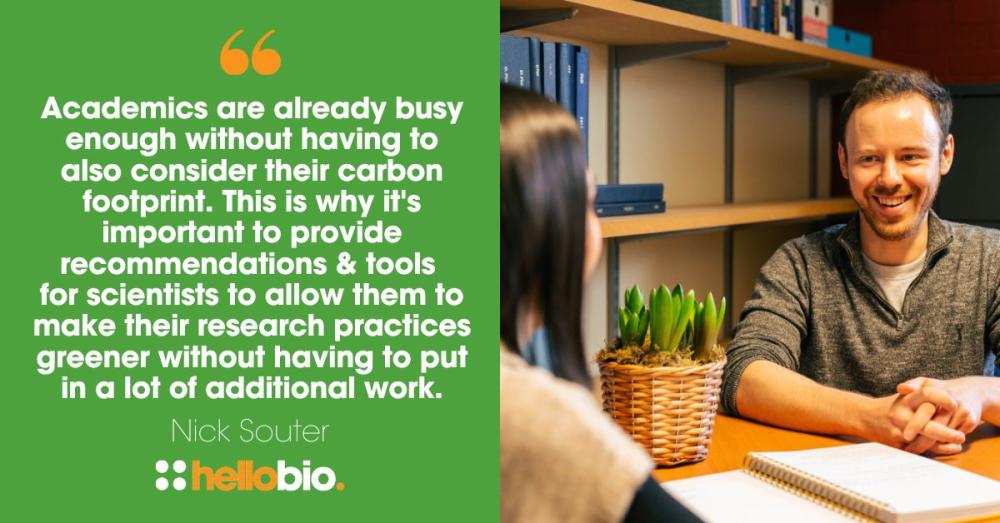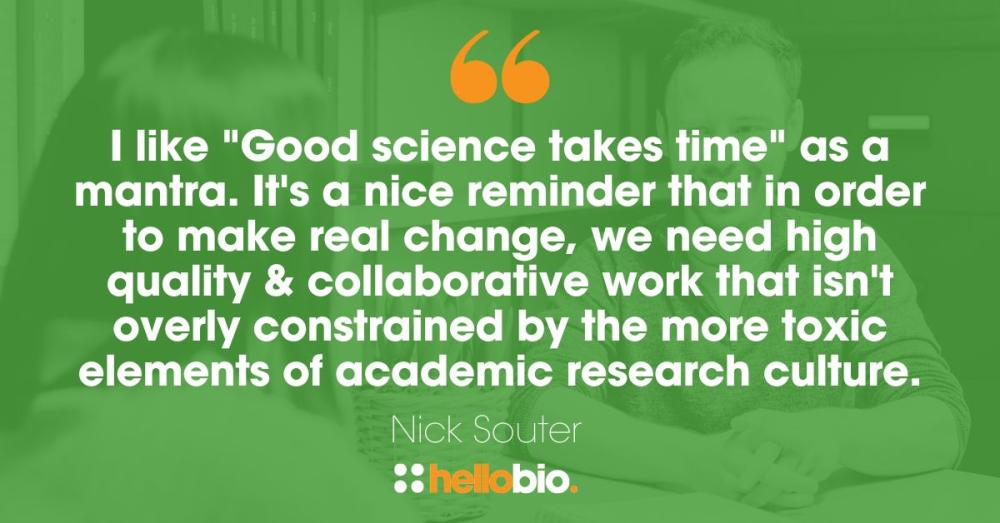Interviews with Scientists: Nick Souter
Our Interviews with Scientists feature is back, and we love having the opportunity to find out more about inspiring researchers who are doing important work around the world. In our latest interview, we spoke to postdoc Nick Souter of the University of Sussex, UK, who was the recent recipient of the British Neuroscience Association’s inaugural Green Neuroscience Prize. His commitment to sustainability and carbon footprint reduction attracted the attention of the BNA who praised his development and promotion of a number of unique green initiatives.
Nick achieved his PhD in Cognitive Neuroscience & Neuroimaging from the University of York in 2023. His current work focuses on measuring and reducing the carbon footprint of computing required in human neuroimaging research, with a specific focus on functional magnetic resonance imaging (fMRI).
We were keen to find out more about Nick’s background in research, his passion for all things green, and his hopes for the future of neuroscience research.
Hi Nick, please can you tell us a little bit about your current role at the University of Sussex?
I work on measuring, and making recommendations for reducing, the carbon footprint of research computing in neuroimaging. Whichever discipline you work in, storing and processing large amounts of data uses energy, and therefore has a carbon footprint. This is true in human neuroimaging, where we need to take data and do things like reshape it, remove noise, and correct distortion before we can begin to statistically analyse it. I run studies with existing data and use carbon tracking tools to measure the carbon footprint of data processing across different settings and software packages. There's a lot of public engagement and dissemination involved in the role too, presenting our findings and recommendations to multidisciplinary audiences at workshops and conferences.
What was the focus of your PhD research?
My PhD was in Cognitive Neuroscience & Neuroimaging, and focused on the retrieval of semantic concepts using a combination of cognitive neuropsychology and fMRI neuroimaging. I was specifically interested in whether the processes in the brain that we use to retrieve knowledge about the world are also used for our processing and understanding of emotional stimuli. Based on our findings, it looks like there are some shared mechanisms here.
Did you always want to work in science when you were younger, and if so why?
I had no real sense of what I wanted to do while at school. After studying for an undergraduate degree in Psychology, my first goal was becoming a clinical neuropsychologist, I had no interest in staying in research. It was only while writing my Masters dissertation that I realised that academic research was something that I enjoyed and that I could be good at, and ever since then it's been a great fit.
What excites you most about the work that you do?
To date, the carbon footprint of research computing has been a fairly neglected topic, and with advances in and increased adoption of machine learning this issue is likely to become more pressing in the coming decade. It's been exciting to be able to identify behaviours that could really help to address this issue, and to contribute to conversations about this aspect of research culture. There is a small but dedicated group in the UK committed to identifying best practices for sustainable academic research, and it's been great to see these same faces at multiple events and hear about progress being made. Also, I think I may be the only person in the world working full time on the specific intersection of computing, sustainability, and neuroscience, which is a cool feeling. It's been great to develop some expertise in this niche.
You recently won the BNA’s 2024 Green Neuroscience Prize for your commitment to sustainability in neuroscience. Why is this topic so important, and what does the prize mean to you?
Science is going to play a crucial role in combatting the climate crisis. However, we need to accept that our research practices also contribute to this crisis. If we're going to conduct ethical and responsible research, we need to take steps to reduce the negative impacts of our work, whether in neuroscience or not. To me, the BNA's Green Neuroscience Prize signals that the BNA is taking this issue seriously, which is really encouraging to see. I'm honoured to be its first recipient.
You were praised for leading and promoting green initiatives in research - can you tell us more about some of these?
With my PI Dr Charlotte Rae, and other multidisciplinary collaborators, I published a review paper providing 10 recommendations for neuroimagers to reduce their computing carbon footprint, and conducted two empirical studies measuring and comparing the carbon footprint of specific data processing tools. I've also released two public green computing tools; 'Calc_carbon', which is a novel carbon tracking approach, and 'fMRIPrepCleanup', which finds and removes unneeded junk files in fMRIPrep (an fMRI preprocessing tool) output. Last year, I worked with collaborators to organise a workshop focused on the environmental impacts of computing, and we'll be running more workshops on this topic over the summer.
What are the biggest challenges scientists face when trying to reduce the environmental impact of their research work?
As is often the case, I think the largest obstacle is finding the time to educate oneself and take action. Academics are already busy enough with collecting data, analysis, open science practices, teaching, and admin, without having to also consider their carbon footprint. This is why I think it's important to provide recommendations and tools for scientists to allow them to make their research practices greener without having to put in a lot of additional work.
What more could universities and other institutions do to promote sustainability within science research?
Funders have a big role to play here in incentivising environmentally sustainable practices. For instance, applicants could be told they're expected to at least consider what the carbon footprint of their work is likely to be, as well as whether there's any way to reduce this. Probably the most significant thing universities and other research institutions could do is hire technical staff in roles explicitly focused on environmental sustainability. This takes some of the burden off of individual researchers and makes it easier to build the momentum of green initiatives.
What are your hopes for the future of neuroscience, in terms of sustainability?
In terms of computing (my current niche), I hope that the average high-performance computing user will at least become aware that data processing and storage have a carbon footprint. I think this awareness would encourage researchers to be more mindful in how they use computers, and encourage them to seek out and engage with green computing tools and recommendations. In terms of actually running MRI scans, we currently rely on liquid helium for cooling. Liquid helium is just a byproduct of fossil fuel extraction, so it's inherently unsustainable. So we're going to need an innovative alternative here if we want to keep conducting neuroimaging research!
Who has been the most influential mentor in your career so far?
My supervisor Beth Jefferies has been an excellent mentor in designing, conducting, and publishing novel research paradigms. My current PI Charlotte Rae has also been a big inspiration in terms of translating an interest in environmental sustainability into my work, and in further developing expertise in fMRI analysis.
What's the most valuable piece of career advice you’ve ever been given?
Although possibly controversial, the best advice for me has been not to plan too hard. Speaking as someone whose career goals have changed a lot in the past 5 years, it's been refreshing to be able to dive into new projects which I find interesting, even if they don't fit well with my current specialism. It's felt like my career has been progressing well despite not focusing on a single topic, and it's meant I've been able to apply my skills to a wide variety of questions.
How do you see your career progressing in the future/where do you see yourself in 10 years?
In June 2024, I'll be starting on a new project with my current lab group, now focusing on the effects of working patterns on mental health, cognitive function, and brain activation. Alongside this, I'll continue work on the carbon footprint of neuroscience research computing, hopefully with some more opportunities to disseminate our recommendations to neuroimagers throughout the UK and beyond. I'm not sure what will follow that, but I'd love to keep working on research topics that have fairly direct implications for policy and health.
Outside of your career, what do you enjoy doing most?
I'm an avid indoor boulderer, which is probably the hobby I spend most time on these days. After a bit of a hiatus I've also been trying to get back into playing music, including guitar and banjo.
What do you think is the greatest scientific discovery of all time?
Although it might sound boring, I would say the discovery of natural selection. It's hard to think of another discovery that has been so central to modern science while also being so intuitive and easy to grasp.
Do you have a favourite science book, or a book you would recommend every neuroscientist reads?
For anyone interested in neuropsychology, I'd recommend 'Patient H. M.: A Story of Memory, Madness, and Family Secrets' by Luke Ditrich. It's a really nicely written account of our history of trying to understand and treat the human brain, including some cases where we've maybe done more harm than good. I'd also recommend 'Other Minds: The Octopus, the Sea, and the Deep Origins of Consciousness' by Peter Godfrey-Smith, which dives into the ways cephalopods, like octopuses, experience the world, and their capacity for conscious experience.
What’s your favorite science quote?
I don't think it's an actual quote that can be attributed to anyone, but I like "Good science takes time" as a mantra. It's a nice reminder that in order to make real change, we need high quality and collaborative work that isn't overly constrained by the more toxic elements of academic research culture.
And finally… are there any other specific issues or initiatives in science that you are involved with or are passionate about?
Over the past year, I've become more engaged in open sciences practices including preregistration and sharing of all data and code from research projects. I think this is crucial for conducting reproducible and accountable science.
________________________________
Thanks for such a fascinating and informative interview Nick. Keep up the great work, and we look forward to following the development of your excellent initiatives!
Connect with Nick:
- Twitter: Nick Souter
- LinkedIn: Nick Souter
________________________________
If you enjoyed this article, why not check out the other resources available on our blog. We are passionate about supporting life scientists including early career life scientists and PhD students - with really low-priced reagents, antibodies and biochemicals, early career scientist grants, and resources to help with both personal and professional development. We know how tough it is - so we hope you find these helpful!
More General Support for Life Scientists
For advice on wellbeing, dissertations, presenting at conferences, wellbeing, PhD support, networking and lots more, we have a huge range of articles to help - just click below:
Save up to 50% on our high purity reagents...
When you get to the stage of planning your experiments, don't forget that we offer a range of low-cost, high-purity agonists, antagonists, inhibitors, activators, antibodies and fluorescent tools (yes - they really are around half the price of other suppliers!) You can use our Quick Multi-Search Tool to search for lots of products in one go, and the range includes:
- Enzyme inhibitors and activators
- Chemogenetic ligands
- Ion channel modulators
- GPCR & ionotropic receptor ligands
- Cell biology reagents & biochemicals
Technical resources
Try our Molarity Calculator: a quick and easy way to calculate the mass, volume or concentration required for making a solution.
Try our Dilution Calculator: an easy way to work out how to dilute stock solutions of known concentrations
We also offer a comprehensive range of technical resources including antibody protocols and methods, product guides and mini-reviews:
And finally, don't forget to check back in with our blog regularly for our latest articles. If there’s something you’d love to contribute to the community, whether that’s an interview or article, drop us a line at hello@hellobio.com
---






















